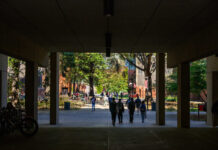Without the foresight and work of Robert Doherty nearly 50 years ago, however, the archives might be much different. The former faculty member of UofL’s Allen R. Hite Institute will receive a Doctor of Fine Arts honoris causa degree at the May 8 commencement ceremony. Photographic Archives will open an exhibition of his own photography, along with important images from collections he established in the archive, Friday, May 7, with a reception from 3 p.m. to 5 p.m.
Doherty came to UofL in 1959 as a professor in photography, but he also developed programs in graphic design and art therapy. He started the photographic archives to provide a resource collection for the photography program.
While others have contributed to the growth and success of the Photographic Archives over the years, we all attribute the vision, scope — and most of the internationally significant collections — to Bob Doherty, said Delinda Buie, head of Special Collections.
One of the first university-based photographic collections in the country, the Photographic Archives now has nearly 2 million images.
Among the most famous are those taken as part of the Farm Security Administration Photo-documentary Project in the 1930s. When Doherty convinced Roy Emerson Stryker, director of the FSA project, to place his personal archive and correspondence at UofL, he put the archive on the international map.
Stryker was so impressed with UofL’s commitment to preserving historic images, that he worked with Doherty to place the complete archive of his other great photo documentary project, the Standard Oil (New Jersey) collection, at UofL.
Images from those collections remain in high demand by authors, editors and filmmakers.
But that is not the reason he is deserving of the honorary degree, Buie said.
His influence, she said, is the reason she nominated him.
Bob Doherty has made profound impact on his students and colleagues, on academic disciplines, on institutions and communities, Buie said. He has worked in photography, design, typography and letter press, and in historic preservation. He has inspired and mentored students and professionals; established a generous legacy as artist, teacher and activist; and lived a passionate life as change agent and provocateur.
Bob Doherty exemplifies our values as an institution — willing to push the edges and do what matters for the future instead being complacent in the present, she said.
Doherty left UofL in 1972 to become director of the prestigious George Eastman International Museum of Photography. He later was at the Salt Lake Art Center, New York State College’s Alfred University, founded the International Archive of Photography in the Czech Republic and revived the influential book arts program at Wells College Press.
Over the decades, however, Doherty has remained a benefactor and had significant influence in the growth and reputation of the Photographic Archives.


























